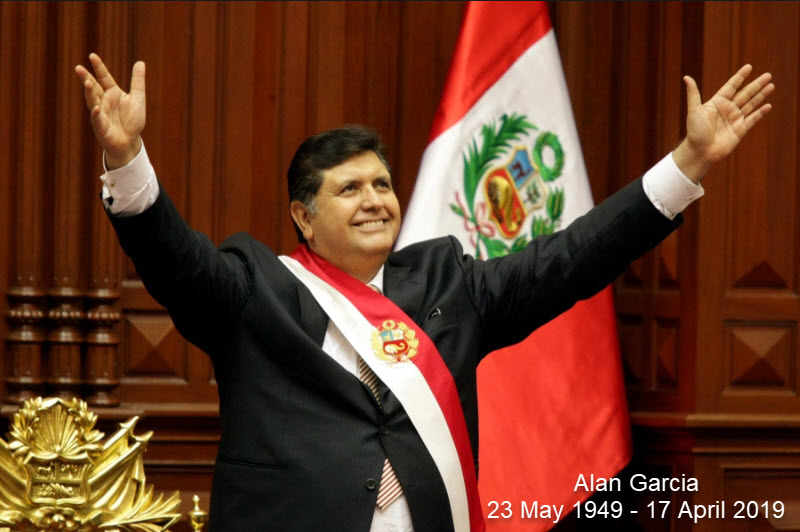
Former President Alan Garcia died this morning at the Casimiro Ulloa trauma hospital, after shooting himself in the head.
Six police and a district attorney arrived at Garcia’s home around 6:15 am today, with an order for his preliminary arrest related to the Odebrecht corruption scandals. According to Garcia’s personal secretary, Ricardo Pinedo, Garcia refused to descend the stairs to receive what the D.A. described as a search warrant and instead returned to his bedroom, locked the door, and shot himself in the head with a handgun. Garcia was rushed to the trauma hospital where neurosurgeons reported he suffered at least three cardiac arrests. His death was announced by APRA party colleagues just after 9:30 am.
The search and arrest warrant, on allegations of money laundering and organized crime related to the Odebrecht corruption scandals, also includes eight other Apra party members who served in or were linked to Garcia’s most recent administration (2006-2011). The allegations are connected to the Lima Metro Line 1 construction contract signed by President Garcia and Odebrecht. In January 2017, Odebrecht acknowledged it paid $8 million in bribes to win the Metro construction bid.
Garcia swept into office in 1985 as Latin America’s youngest president at 36, a prototype of leftist South American populist leaders.
At first, his popularity soared, as he proclaimed a new socialist deal for Peru’s poor, attempted to nationalize the banks and balked at paying off the nation’s huge foreign debt. He railed against Washington’s intervention in Nicaragua and its invasion of Panama. But his five-year term ended disastrously, with Peru mired in four-digit inflation, food shortages and guerrilla violence.
He escaped from Peru under a cloud of corruption allegations in April 1992, a step ahead of soldiers and police sent to his home to arrest him.
After a decade in exile in Colombia and then France, Garcia returned to Peru in 2001 after his political rival President Alberto Fujimori’s 10-year authoritarian regime crumbled under the weight of massive corruption and human rights violations. With the statute of limitations having run their course on his own corruption charges, Garcia again ran for a presidential second term in 2006, and won.
Discarding his leftist roots, the once reviled leader projected a new image, preaching a fiscally conservative brand of thrifty government, albeit with increased spending on social programs.
But again corruption became a major issue, particularly with government contracts for highways, irrigation schemes and Lima’s mass transit system. Allegations and half-hearted investigations lagged until 2015, when the Odebrecht bribery scandals burst open in the U.S. and across Latin America. To avoid life-long prison terms, the Odebrecht owners and officers turned state witnesses in Brazil. Peru’s judiciary recently reached agreements in which the main officers have begun to give details of bank transfers to offshore accounts held by government officials and in some cases front men through several administrations — and the case of the Apra administration, these include four accounts in Andorra that a total $1.3mn, plus transfers for a total of more than $4mn to an Apra member, Luis Nava, who worked closely with Garcia during his administration. The arrest warrant for Garcia also included Nava and his son — Nava entered a private clinic this week and his son is in Miami on a medical check-up.
The most damning evidence is due next week, from Jorge Barata, who led Odebrecht’s operations in Lima and was a frequent visitor to the government palace during the Garcia presidency.
Facing a court order not to leave the country and the threat of preliminary arrest, Garcia vehemently and defiantly denied the allegations against him, telling reporters the night before taking his own life, “after being president of Peru twice, I’m not afraid of those things.”
“I am the most investigated man in Peru in the last 30 years,” he said. “There is no factual basis, stated concrete fact. Everything is speculation. With speculation, a person is not deprived of freedom, even in a preliminary manner. It seems to me that this would be a great injustice.”





